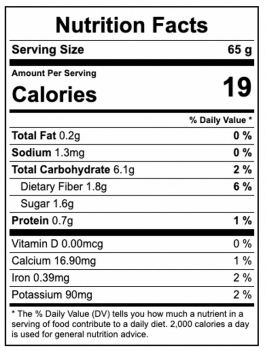
Sliced lemons
Lemons pack a powerful taste with their natural tart flavor. That tartness comes from citric acid. For some people, citric acid helps in preventing kidney stones; for the rest of us, it’s just tastes great. We love lemons for the flavor they add to so many foods—including healthy choices like fresh water, green salads, fish, vegetables, and more! Lemons are packed with vitamin C—about a third of your daily requirement. The little lemon also provides us with soluble dietary fiber—that could partly explain the popularity of adding a slice of lemon to your water.
Here is the nutrition information for one lemon:

The carbohydrates in that single lemon are 1.6 gram of sugar and 1.8 gram of dietary fiber, with the rest complex carbohydrates. Lemons contain no saturated fat or cholesterol.
Here are some of the compounds in lemons:
Vitamin C: The vitamin C in lemons is an antioxidant necessary for immune system and skin health.
Citric Acid: Citric acid may help prevent the formation of kidney stones.
Diosmin: This antioxidant helps improve muscle tone and reduce inflammation in blood vessels.
D-limonene: This compound is in the peel of the lemon, and can help relieve heartburn. It’s also a primary component in essential oils.
Folate (vitamin B9): This is important for normal tissue growth and cell function and is fundamental for pregnant women and older adults.
Flavonoids: These dietary compounds work as antioxidants to defend the body against damage from free radicals.
Potassium: This mineral is involved in many essential body functions, such as regulating blood pressure.
Hesperidin: This antioxidant may contribute to reducing the buildup of plaque in your arteries.
Phenolic antioxidants: Lemons are rich in these antioxidants; they’ve been linked to numerous health benefits, including fighting bacteria, reducing the risk of cancer, and acting as an anti-inflammatory.
Did you know all these nutrition facts about lemons? Please tell us what you think.


 Previous
Previous

